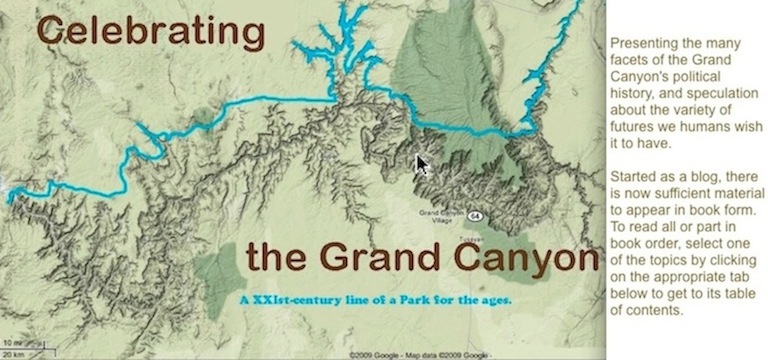DUMPING THE DAMS; 1966-8
One Story The Newspapers Tell
Fifty years ago, 30 September 1968, President Lyndon B. Johnson signed the legislation that gave Arizona its big Central Arizona Project (CAP) waterworks, while firmly protecting the Grand Canyon by rejecting the idea of ever approving construction in it of two huge concrete dams.
In three dozen recent posts, I have summarized, as written about in the public press, the climax years for Congressional action on a complex of Colorado River Basin projects and policies that included the Central Arizona Project, the future of the Grand Canyon, and associated items that wrapped up a half century of Basin law-making and project-building.
Reading through the media summaries, more than one narrative will be evident; there was, after all, a plethora of interests and actors. One set sought to push through the CAP, others wanted to protect interests they saw threatened by the CAP, still others to bring some kind of resolution to a debate that had started with the century. In this very long post, I aim to delineate the key moments and flow of events from my perspective as an advocate for a damless Grand Canyon.
The narratives, as always, proceeded as they did with a heavy dependence on the particular actors and their situations, as well as the real policy considerations they all had to contend with. (A glossary of names and terms is appended to this document, along with a note on the sources.) Sometimes it seems an actor appears determinative; sometimes, the events flowed as with their own life.
While the interpretation here is mine, I also hope it sets up an armature from which the important bits and pieces of the story can be hung and make sense in their relation to the whole.
Dams, Of Course (1965)
It is a measure of how different a society we were in mid-century that the assumption undergirding news reporting on the CAP legislation was that the decision to build dams in the Grand Canyon was foregone, essential, right, a social good. It was barely credible that the damage they would do (underestimated for sure) could power an opposition that would shape the 1966-7 events and make dams forsaken, unnecessary, wrong, and their rejection a great social step forward.
